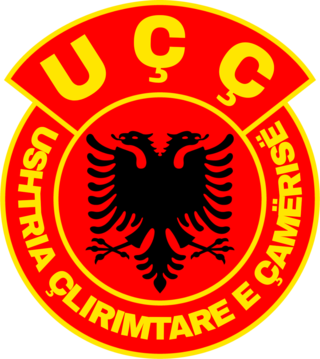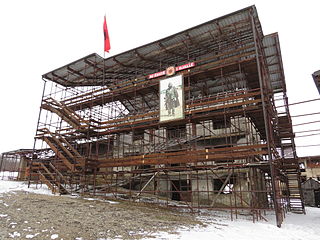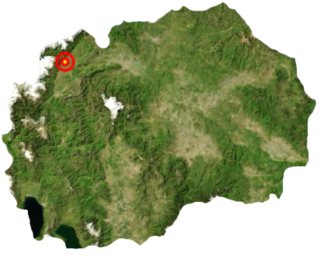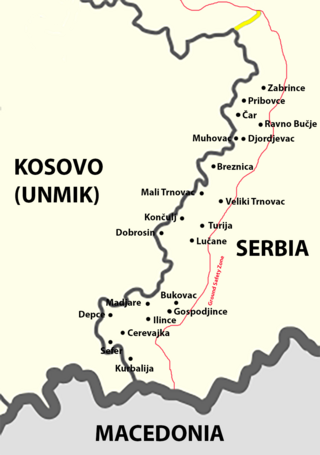Contents
- Incumbents
- Events
- January
- February
- March
- April
- May
- June
- July
- August
- September
- October
- November
- December
- Deaths
- See also
- References
| |||||
| Decades: | |||||
|---|---|---|---|---|---|
| See also: | Other events of 2007 List of years in Albania | ||||
Events from the year 2007 in Albania.
| |||||
| Decades: | |||||
|---|---|---|---|---|---|
| See also: | Other events of 2007 List of years in Albania | ||||
Events from the year 2007 in Albania.

Kosovo, officially the Republic of Kosovo, is a country in Southeast Europe with partial diplomatic recognition. Kosovo lies landlocked in the centre of the Balkans, bordered by Serbia to the north and east, North Macedonia to the southeast, Albania to the southwest, and Montenegro to the west. Most of central Kosovo sits on the plains of Metohija and the Kosovo field. The Accursed Mountains and Šar Mountains rise in the southwest and southeast, respectively. Kosovo's capital and largest city is Pristina.

The Kosovo Liberation Army was an ethnic Albanian separatist militia that sought the separation of Kosovo, the vast majority of which is inhabited by Albanians, from the Federal Republic of Yugoslavia (FRY) and Serbia during the 1990s. Albanian nationalism was a central tenet of the KLA and many in its ranks supported the creation of a Greater Albania, which would encompass all Albanians in the Balkans, stressing Albanian culture, ethnicity and nation.

The Liberation Army of Preševo, Medveđa and Bujanovac was an Albanian militant insurgent group fighting for separation from the Federal Republic of Yugoslavia for three municipalities: Preševo, Medveđa, and Bujanovac, home to most of the Albanians in south Serbia, adjacent to Kosovo. Of the three municipalities, two have an ethnic Albanian majority, whilst Medveđa has a significant minority of them.

The National Liberation Army, also known as the Macedonian UÇK was an ethnic Albanian militant and separatist militia that operated in the Republic of Macedonia in 2001 and was closely associated with the Kosovo Liberation Army (KLA). Following the 2001 insurgency in Macedonia, it was disarmed through the Ohrid Framework Agreement, which gave greater rights and autonomy to the state's Macedonian Albanians.

The 2001 insurgency in the Republic of Macedonia was an armed conflict which began when the ethnic Albanian National Liberation Army (NLA) insurgent group, formed from veterans of the Kosovo War and Insurgency in the Preševo Valley, attacked Macedonian security forces at the end of January 2001, and ended with the Ohrid Agreement, signed on 13 August of that same year. There were also claims that the NLA ultimately wished to see Albanian-majority areas secede from the country, though high-ranking members of the group have denied this. The conflict lasted throughout most of the year, although overall casualties remained limited to several dozen individuals on either side, according to sources from both sides of the conflict. With it, the Yugoslav Wars had reached the Republic of Macedonia which had achieved peaceful independence from Yugoslavia in 1991.

NorthKosovo ; also known as the Ibar Kolašin ; earlier Old Kolašin,, is a region in the northern part of Kosovo, generally understood as a group of four municipalities with ethnic Kosovo Serbs majority: North Mitrovica, Leposavić, Zvečan and Zubin Potok.

The Insurgency in the Preševo Valley was an approximately two year-long armed conflict between 1999 and 2001, between the Federal Republic of Yugoslavia and the ethnic Albanian separatists of the Liberation Army of Preševo, Medveđa and Bujanovac (UÇPMB). There were instances during the conflict in which the Yugoslav government requested KFOR support in suppressing UÇPMB attacks since they could only use lightly armed military forces as part of the Kumanovo Treaty that ended the Kosovo War, which created a buffer zone between FR Yugoslavia and Kosovo.

The Liberation Army of Chameria is a reported paramilitary organization founded in 2001 that is active in the northwestern Greek region of Epirus. The group is reportedly linked to the Kosovo Liberation Army (KLA) and National Liberation Army (NLA), both ethnic Albanian militant groups.

The Albanian National Army is an Albanian paramilitary organization which operates in North Macedonia, Serbia and Kosovo. The group opposes the Ohrid Framework Agreement which ended the 2001 insurgency in Macedonia between members of the National Liberation Army and Macedonian security forces.

The Attack on Prekaz, also known as the Prekaz massacre, was an operation led by the Special Anti-Terrorism Unit of Serbia which lasted from 5 to 7 March 1998, whose goal was to eliminate Kosovo Liberation Army (KLA) suspects and their families. During the operation, KLA leader Adem Jashari and his brother Hamëz were killed, along with nearly 60 other family members.

The Battle of Belaćevac Mine was a week-long clash between the Yugoslav Army (VJ), Serbian police (MUP) and the Kosovo Liberation Army (KLA) in June 1998, during the Kosovo War. It was fought over the Belaćevac coal mine, which powered two generating stations that supplied electricity to most of Kosovo.

The Insurgency in Kosovo began in 1995, following the Dayton Agreement that ended the Bosnian War. In 1996, the Kosovo Liberation Army (KLA) began attacking Serbian governmental buildings and police stations. This insurgency would lead to the more intense Kosovo War in February 1998.

Operation Mountain Storm was carried out on 7 November 2007 by special police forces of the Republic of Macedonia against an armed ethnic Albanian group in the Šar Mountains of Brodec above Tetovo region with ties to Albanian paramilitary of the conflicts in Kosovo (1998–1999), Preševo Valley (2000–2001) and Macedonia (2001).

The 2015 Kumanovo clashes, also known as Operation Divo naselje, were series of shootouts which erupted during a raid between the Macedonian police and an armed group identifying itself as the National Liberation Army (NLA). They began on 9 May 2015 in the northern Macedonian town of Kumanovo. During the shootings, eight Macedonian policemen and 14 of the militants were killed, while 37 officers were wounded and hospitalized. The shooting ended on 10 May 2015, in an operation by the Macedonian police and armed forces, in which 30 militants were arrested and charged with terrorism-related charges by the Macedonian authorities.

On December 14, 1998, the Yugoslav Army (VJ) ambushed a group of 140 Kosovo Liberation Army (KLA) militants attempting to smuggle weapons and supplies from their base in Albania into the Federal Republic of Yugoslavia. A five-hour battle ensued, ending with the deaths of 36 militants and the capture of a further nine. Dozens more fled back to Albania, abandoning large quantities of weapons and supplies, which the Yugoslav authorities subsequently seized. The ambush was the most serious war-related incident in Kosovo since a U.S.-negotiated truce took effect two months before. It came on the heels of increasing tensions in the province, where inter-ethnic violence had been escalating steadily since early 1995.

On the morning of April 23, 1998, a band of Kosovo Liberation Army (KLA) fighters was ambushed by a much smaller group of Yugoslav Army (VJ) border guards near the Košare outpost, just west of Deçan. The fighters had been trying to smuggle weapons and supplies into Kosovo via northern Albania. Nineteen were killed in the ensuing attack, and a further two were captured. The VJ did not sustain any casualties. Some of the militants retreated back to Albania, while others managed to break through the ambush and make it past the Yugoslav border, into Kosovo. Following the clash, the VJ confiscated a large quantity of arms that the militants had been transporting.

On July 18, 1998 a Yugoslav Army (VJ) border patrol ambushed a column of Kosovo Liberation Army (KLA) insurgents and foreign mujahideen just west of Deçan, on the frontier between Albania and Yugoslavia. The ambush resulted in the deaths of four KLA fighters and 18 mujahideen, most of whom were citizens of Saudi Arabia. Twelve militants were wounded, and a further six were arrested by the Yugoslav authorities and charged with illegal entry and gunrunning. The VJ reported seizing a significant amount of arms and ammunition that the militants had been smuggling. One Yugoslav border guard was seriously wounded in the clash.
This article includes information on actions described as terrorist acts in the Federal Republic of Yugoslavia, Serbia and Montenegro (2003–2006) and Serbia.

The Ground Safety Zone was a 5-kilometre-wide demilitarized zone (DMZ) established in June 1999 after the signing of the Kumanovo agreement which ended the Kosovo War. It bordered the area between inner Republic of Serbia in the Federal Republic of Yugoslavia (FRY) and Kosovo.